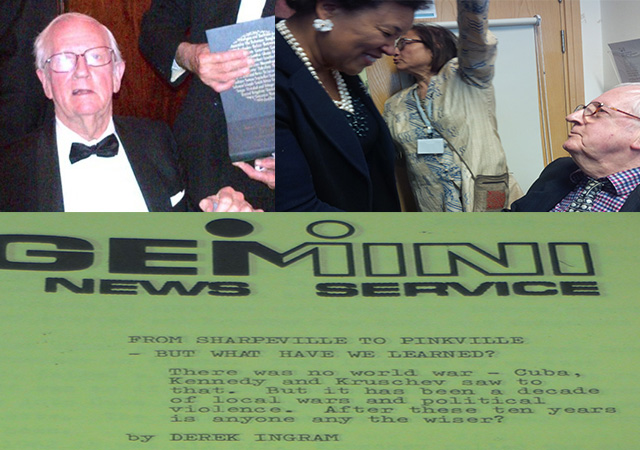 (l-r) Derek Ingram receiving a 2012 CJA Award for Outstanding Journalism, with Secretary-General Patricia Scotland in 2016, Gemini News Special
(l-r) Derek Ingram receiving a 2012 CJA Award for Outstanding Journalism, with Secretary-General Patricia Scotland in 2016, Gemini News Special
By comparison with the 70th anniversary of independence for millions from the Indian Raj, the 50th birthday of Gemini News Service, founded by a long-serving member of the Round Table, was never going to get wall-to-wall coverage on television in South Asia and the UK. But this was a news feature operation set up in the midst of the Cold War, designed to break out of stereotypes and assist developing countries intelligently at a time when ‘Minister says’ journalism was all the rage in state-owned media. Its death in 2002 was unremarked upon, except by the 100 or so news organisations which had been taking what had started as twice-weekly airmailed packages. Now, in the internet era, it seems hopelessly old-fashioned.
Yet this small and battling news service based in London, forever at risk of running out of funds, had an honourable role in helping newly independent countries to understand each other, in making sense of the concept of ‘development journalism’ and in challenging ideas about and inside what was then described as the Third World. One of its pioneering exercises was a village reporting project, where local journalists who might otherwise have migrated to the capital were encouraged to stay in the countryside and report significant news that was overlooked in ministries and in the developed world.
Gemini was called a news service because Derek Ingram, its architect, thought that ’features’ was a slow word, and it did have some remarkable news exclusives. One of these was a report by Richard Hall, in January 1970, on the collapse of Biafra, Nigeria’s eastern breakaway province. Unprecedentedly, it was put on the front page of both The Sunday Times and its London rival, The Observer. Yet more typical were articles from indigenous journalists in developing countries, who were given an international platform. And underpinning Gemini was Ingram’s passion for the Commonwealth, which he saw as a new entity in international affairs, dangerously undermined by a lack of mutual knowledge in its peoples.
Now, when cyberspace is full of blogs and messages from all over, and technology take-up means that Indians are at the cutting edge and many Nigerians carry three mobiles, does the idea of development journalism have any traction? It always had more than one meaning. In countries like Canada and the UK it was seen as explanatory, helping readers, viewers and listeners to understand how the poorer South sees events and incidentally showing that so-called developed countries were not so different from those labelled as developing. But in some authoritarian countries in the South the concept was used to justify state control of news media, on the grounds that all citizens must be directed to pull together under the leadership of the government.
Today, the Chinese government, for example, seeks to control how its citizens access the internet. Hovering over all in the 1970s had been the proposed New International Information and Communication Order—promoted by Southern governments angry at the unequal and biased nature of North–South news flows, and rebuffed by Northern media groups, waving the banner of free speech.
There is still a case for development journalism in its liberal and enlightened sense, and the issue of North–South news flows looks more complex today. But what has been learnt from ‘fake news’ and the babel of cyberspace is that provenance, trust and fact-checking are more important than ever before. The international status enjoyed by the BBC, as against say RT (formerly Russia Today), is not a matter of chance; the first is more trusted by more people, because it has taken more care to sift facts and quote a range of opinions, than the second. One of the problems for what US President Trump has dismissed as the mainstream media is that print journalism is losing its commercial base to the internet, and too many internet news services rely on subsidies; this is an issue in the South, as well as the North. The cost of maintaining old-style foreign correspondents is prohibitive for South-based organisations.
Richard Bourne is a member of the Round Table Board and member of its Editorial Advisory Team.



